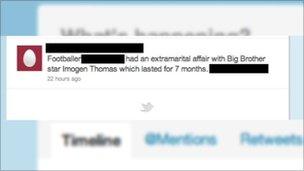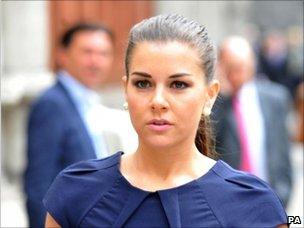Footballer's Twitter disclosure order prompts online action
- Published

Hundreds of tweets have been written about the footballer on micro-blogging website Twitter
Hundreds of Twitter users have reacted to a footballer's bid to find out who is putting information about him on the website by posting new messages online.
The player, who an injunction says can only be identified as CTB, is taking action against ex-Big Brother star Imogen Thomas and the Sun newspaper.
He has now obtained a High Court order asking Twitter to reveal details of users who had revealed his identity.
Twitter has not commented but hundreds of users have repeated his name online.
'Fully entitled'
Papers lodged in the High Court against Twitter and "persons unknown" request disclosure of Twitter users said to have published confidential details.
The order against the US-based micro-blogging website requires Twitter to disclose the requested information within seven days - or within the appropriate time required by the law in California, where it has its headquarters.
Lawyers at Schillings, who represent CTB, have issued a statement clarifying the action it has taken.
It said it was not suing Twitter but had made an application "to obtain limited information concerning the unlawful use of Twitter by a small number of individuals who may have breached a court order".
It comes days after a High Court judge said the footballer was "fully entitled" to anonymity.
Justice Eady has reserved judgement on lifting the injunction after a private hearing with the man's lawyers, the Sun and former Miss Wales Imogen Thomas in London.
However, since news of the disclosure order became public on Friday hundreds of people have tweeted information revealing the footballer's identity.
One message being re-tweeted on the micro-blogging site, stated: "xx xx is suing Twitter. I can't Imogen why."
The legal move by the footballer comes two weeks after a Twitter user tried to unmask some celebrities who have obtained privacy injunctions to prevent publication of details of their private lives.
The Twitter user claimed to "out" a number of UK public figures, although the tweets appeared to contain errors.
Media commentator Steve Hewlett said CTB's lawyers were, in all likelihood, "trying to establish the real identity" of that user.
He said the privacy injunction preventing CTB's identity being revealed had been challenged on the grounds that it was already in the public domain because it was already available on the internet.
Mr Hewlett said "arguing that it's in the public domain because it's already on Twitter" would "put you in a very serious position in terms of contempt of court" if it transpired that "you had anything to do with putting it on Twitter".
There are precedents for legal action to find out the names of individuals behind some Twitter accounts.
'Everybody knows anyway'
Publicist Max Clifford told the BBC that while leaked information on Twitter has a limited impact, journalists can try to use it as leverage.
"It appears to be out of control. It's a strong bargaining chip as journalists want to say, 'Everybody knows anyway,'" he said.
Mr Clifford said some kind of balance must be struck to protect privacy and freedom of speech.

Former reality TV star Imogen Thomas is also facing legal action from "CTB"
The publicist said: "Super-injunctions and injunctions are purely a law for the rich, and purely there to protect the rich.
"What you need is some halfway house between the invading of people's privacy and freedom of the press and information both of which are vital in a democracy."
Twitter has been resisting attempts by the US government to subpoena information on a number of users in relation to the Wikileaks affair.
Media lawyer Nick Lockett said the legal action against Twitter may not have much effect.
"What will have to be established is that Twitter was subject to the jurisdiction of the court," he said. While UK courts claim worldwide jurisdiction this has often proved hard to enforce.
In the case of the US, said Mr Lockett, the situation was complicated by the Communications Decency Act which grants immunity from prosecution for providers of "interactive computer services" under certain circumstances.
Lawyers acting for CTB may struggle to prove that Twitter does not deserve this immunity, said Mr Lockett.
However Graham Shear, a lawyer with experience of applying for super-injunctions, said he thought Twitter would comply with the court order.
"They do actually give a warning to users of the site that the users should comply with the law in the jurisdiction in which they reside and use the media network and therefore I suspect Twitter will reveal voluntarily the information," he said.
"It's simply in compliance with its own guidelines to the users, because obviously somebody has acted in breach of a court order, which has a penal notice and therefore it is an unlawful act to tweet this information."